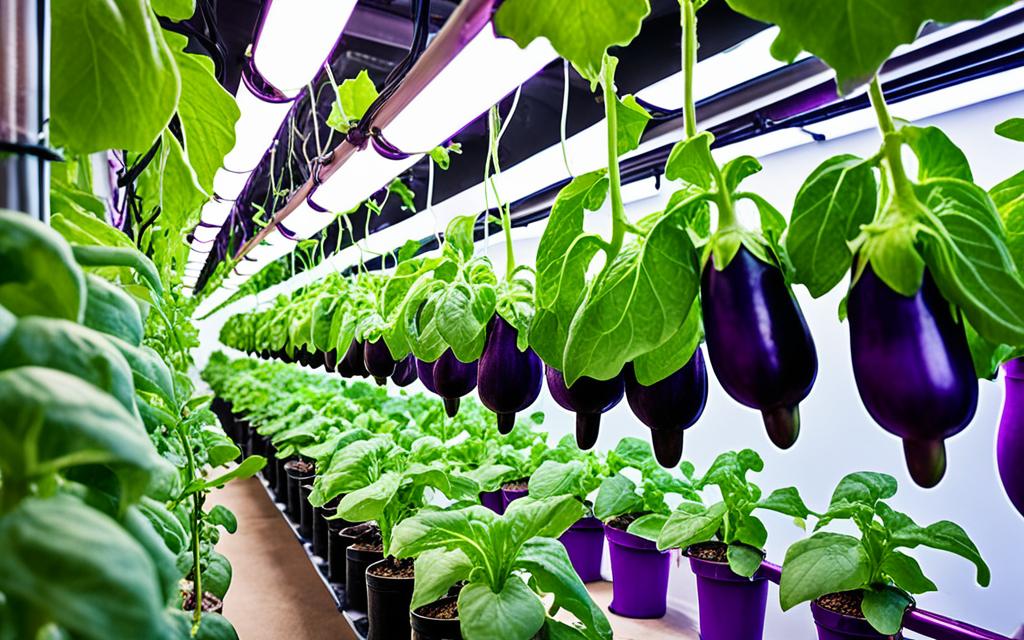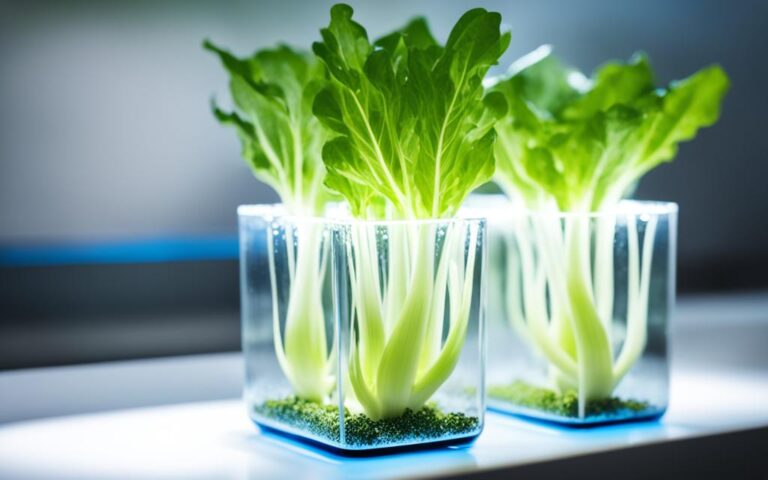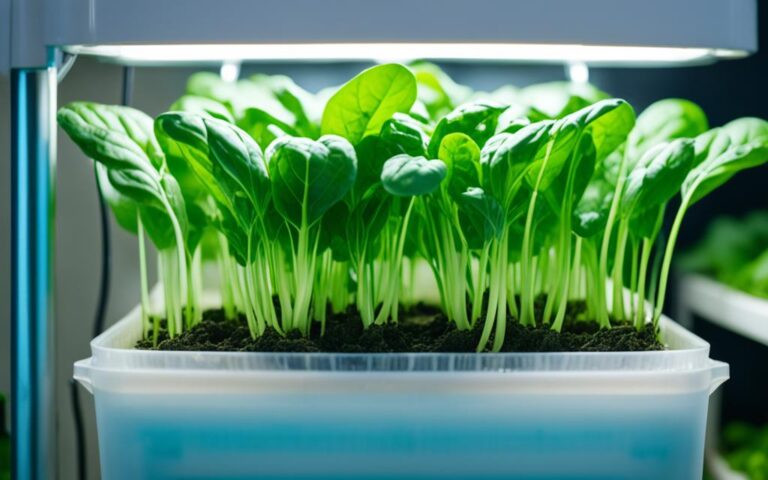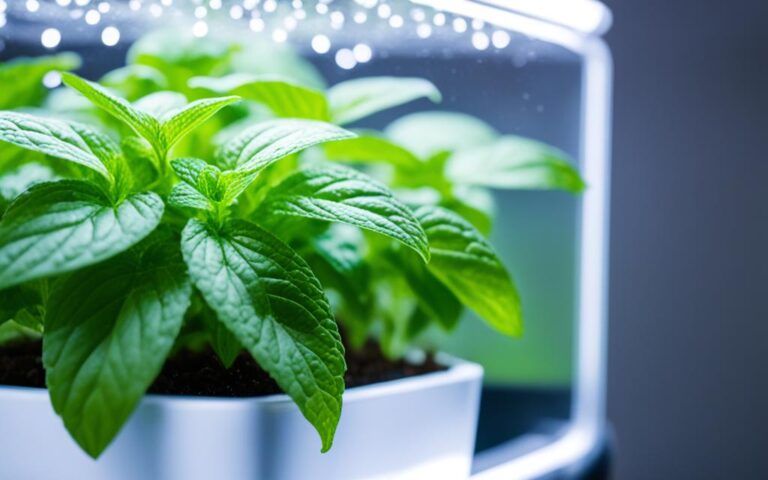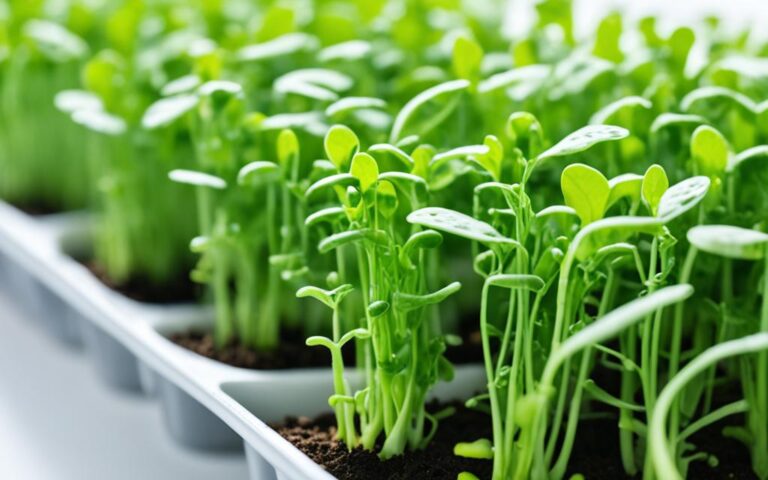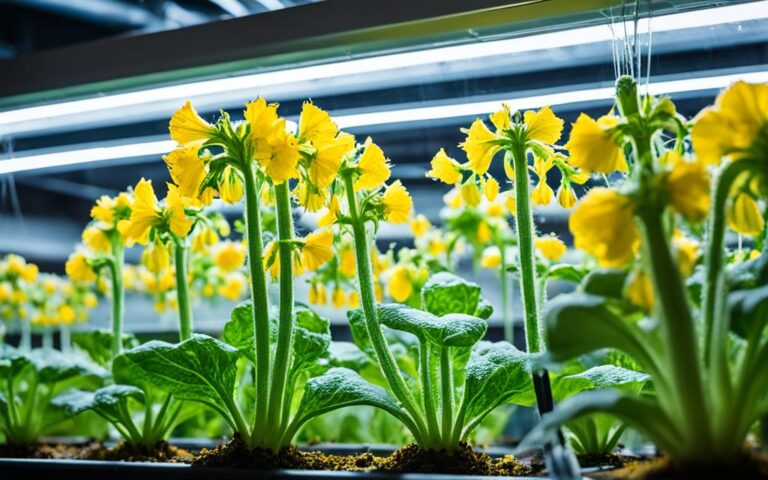Grow Hydroponic Eggplant Successfully | Tips & Tricks
Did you know hydroponic eggplants can produce up to 30% more than traditional farming? This method brings many benefits, like growing all year and controlling the environment for organic farming. If you’re new or experienced in hydroponics, this guide will give you the key tips to grow great hydroponic eggplants.
Key Takeaways
- Hydroponic eggplant cultivation can yield up to 30% more produce than traditional soil-based methods.
- Hydroponic eggplant offers a year-round growing season and a controlled environment for organic production.
- Choosing the right eggplant variety and setting up the proper hydroponic system are crucial for success.
- Proper nutrient management, lighting, and temperature requirements are essential for healthy eggplant growth.
- Pruning, training, and pollination techniques can maximize hydroponic eggplant yields.
Introduction to Growing Hydroponic Eggplant
Hydroponic eggplant farming is a new way to grow this tasty vegetable. It doesn’t need soil. This method gives eggplants a perfect place to grow all year, no matter the weather or where you are. Growing eggplant hydroponically has many benefits for those who want better yields and quality.
Hydroponic eggplant farming lets growers control the plant’s environment. They can adjust things like nutrients, water, pH, and temperature. This makes sure the hydroponic eggplant grows well. It helps growers get great crops all year, even in tough places for farming.
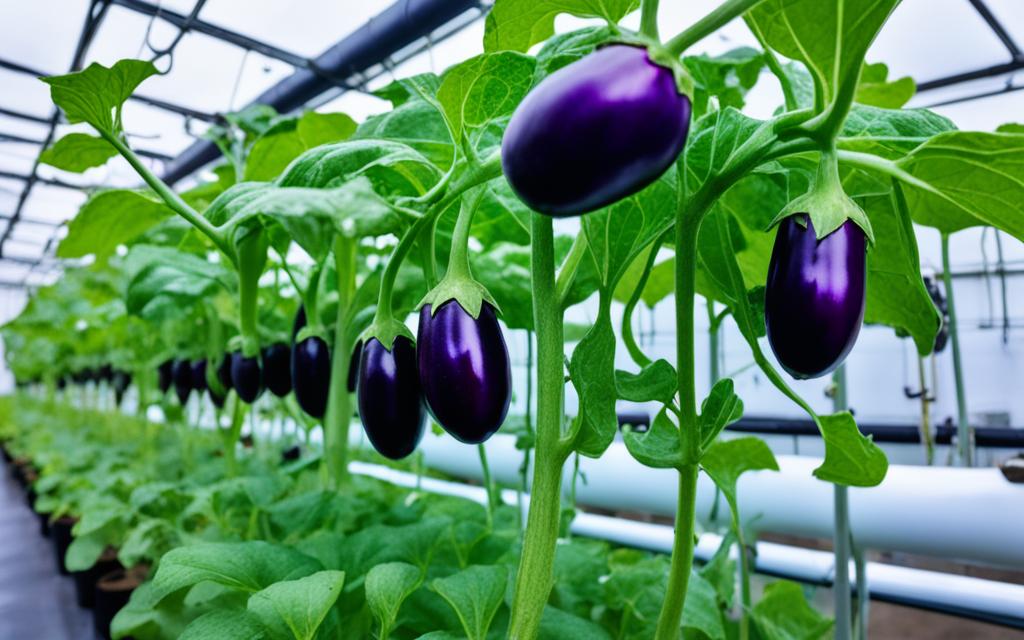
Switching to hydroponic eggplant farming is rewarding for both new and seasoned growers. By learning how to grow eggplant hydroponically, people can make the most of this versatile vegetable. This opens up new chances for cooking and growing food in a sustainable way.
Advantages of Hydroponic Eggplant Cultivation
Growing eggplant hydroponically has many benefits over traditional soil methods. One big plus is growing eggplant all year, no matter the season or weather outside. This is because hydroponics lets growers control things like temperature, humidity, and nutrients. This leads to healthier plants and more produce.
Hydroponic eggplant farming also means growing in a controlled space. By managing water, light, and nutrients, growers can make the best conditions for eggplants. This reduces the effect of bad weather and gives a steady and reliable harvest.
Organic Production
Another big plus of hydroponic eggplant farming is it can be organic. Without soil, pesticides, or synthetic stuff, it’s better for the planet. This means the eggplant is healthier for the plants and safe for people to eat.
| Advantage | Description |
|---|---|
| Year-Round Growing | Hydroponic systems let you grow eggplant all year, no matter the season or weather outside. This means a steady supply. |
| Controlled Environment | Growers can set the perfect conditions for eggplants by controlling temperature, humidity, and nutrients. |
| Organic Production | Hydroponics doesn’t need soil, pesticides, or synthetic stuff. It’s a greener way to grow. |
“Hydroponic eggplant farming lets you grow this versatile vegetable all year. It ensures a high-quality and sustainable product.”
Choosing the Right Eggplant Variety for Hydroponics
Choosing the right eggplant variety is key to success in hydroponics. Some eggplants do better in these systems than others. They are chosen for their growth habits, how fast they mature, and how they handle the controlled environment. By picking the best eggplant varieties for hydroponics, growers can get more from their plants and have plenty of eggplants.
The Black Beauty is a top hydroponic eggplant variety. It has deep purple skin and creamy flesh. It grows well in hydroponics, getting big and ready in 60-80 days.
Rosa Bianca is another great choice for eggplant cultivars for hydroponics. Its fruits are pale lavender-pink and taste sweet. Rosa Bianca does well in hydroponics, giving lots of eggplants all season.
Long Purple is also great for hydroponics. It grows fast and gives a lot of eggplants. These eggplants are loved for their great taste and soft texture.
| Eggplant Variety | Growth Habit | Maturity Time | Suitability for Hydroponics |
|---|---|---|---|
| Black Beauty | Compact, Bushy | 60-80 days | Excellent |
| Rosa Bianca | Upright, Vigorous | 70-90 days | Excellent |
| Long Purple | Upright, Productive | 55-70 days | Excellent |
Choosing the right eggplant varieties for hydroponics sets the stage for a great harvest. With the right variety, a good hydroponic setup, and the best growing conditions, gardeners can have a steady supply of tasty, quality eggplants all year.
Setting Up Your Hydroponic System
To grow eggplant hydroponically, picking the right system is key. You can choose from the ebb and flow system or the deep water culture (DWC) system for eggplant.
Ebb and Flow System
The ebb and flow system floods the roots with water and nutrients, then drains it. This gives the hydroponic eggplant plants the right amount of moisture and nutrients. It’s a trusted method for growing ebb and flow eggplant.
Deep Water Culture System
The DWC system has the roots of hydroponic eggplant plants in the nutrient solution all the time. It also adds air to the roots with an air stone or injector. This setup is great for hydroponic systems for eggplant because it’s efficient.
Both the ebb and flow and DWC systems are good for hydroponic eggplant. They let growers pick the best hydroponic setup for eggplant based on their needs and conditions.
hydroponic Eggplant Propagation
Eggplant is a versatile and tasty vegetable that does well in hydroponic systems. You can start with seeds or clones. Knowing how to grow eggplant in hydroponics is key for a good harvest.
Starting from Seeds
Starting eggplant from seeds in hydroponics needs careful attention. You must watch the temperature, moisture, and light. Plant the seeds in a medium like coco coir or rockwool.
Keep the temperature between 75-85°F (24-29°C) for germination. Make sure the seedlings get enough moisture and light. This helps them grow well in the early stages.
Using Clones
Using clones to grow eggplant is a quick and efficient way. Take cuttings from healthy plants and root them in hydroponics. This skips the seed germination step and gets your plants started faster.
Choosing between hydroponic eggplant propagation and eggplant clones hydroponics depends on you. Both methods work well in hydroponics. It’s about what you prefer and what your setup needs.
Nutrient Management for Hydroponic Eggplant
Getting the right nutrients is key for growing hydroponic eggplants well. These plants need a mix of important nutrients to grow strong and produce lots of fruit. By managing the nutrients carefully, growers can make sure their hydroponic eggplants get everything they need to grow well and produce a lot.
Essential Nutrients for Hydroponic Eggplant
The main nutrients hydroponic eggplants need are nitrogen (N), phosphorus (P), and potassium (K). These nutrients are crucial for things like making food, growing roots, and staying healthy. Eggplants also need smaller nutrients like calcium, magnesium, and trace elements to grow fully.
Maintaining Ideal pH and EC Levels
Keeping the hydroponic solution’s pH between 5.5 and 6.8 helps the eggplants take in nutrients well. The electrical conductivity (EC) of the solution should be between 2.5 and 3.5 dS/m. This means the solution has the right amount of dissolved salts for the eggplants to grow well.
| Nutrient | Optimal Range |
|---|---|
| pH | 5.5 – 6.8 |
| EC | 2.5 – 3.5 dS/m |
Keeping the pH and EC levels right helps hydroponic eggplants get the hydroponic eggplant nutrients they need. This ensures they grow well and produce a lot.
“Proper nutrient management is the foundation for cultivating healthy, high-yielding hydroponic eggplants.”
Light and Temperature Requirements
For hydroponic eggplant to grow well, it needs the right light and temperature. This warm-weather crop does best in a controlled hydroponic setup. Growers must make sure their setup has the right lighting and temperature for the plant to flower, develop fruit, and be productive.
Eggplant needs 16 hours of light each day. You can use artificial lights like high-intensity LEDs or HPS grow lights for this. These lights give the plants the right kind and amount of light for photosynthesis and strong growth.
Keeping the temperature right is also key for hydroponic eggplant. The best temperature is between 70°F to 80°F. Keeping the environment in this range helps the eggplant stay healthy and productive.
| Lighting Requirement | Temperature Requirement |
|---|---|
| 16 hours of light per day | 70°F to 80°F |
By giving your hydroponic eggplants the right hydroponic eggplant lighting and temperature, you can help them grow well. This leads to lots of high-quality eggplants.
Pruning and Training Hydroponic Eggplant
Hydroponic eggplant plants can get big and spread out. So, it’s key to prune and train them to keep them healthy and productive. By cutting off suckers or lateral shoots, the plant puts more energy into growing bigger, better hydroponic eggplant.
Training your eggplants is also a good idea. Putting them on trellises or cages helps support the plant and makes the most of your space. This keeps the plants tidy, improves air flow, and lets more light in. This leads to better hydroponic eggplant pruning and more fruit.
- Prune off any suckers or lateral shoots to redirect the plant’s energy
- Train eggplant vines onto trellises or cages to support the plant’s structure
- Optimize growing space and improve air circulation and light penetration
“Proper pruning and training are essential for achieving a bountiful hydroponic eggplant harvest. By taking the time to maintain your plants, you’ll be rewarded with larger, healthier fruits.”
For successful eggplant training hydroponics, keep up with pruning and training. By caring for your plants, you’ll get a great hydroponic eggplant crop.
Pollination Techniques for Hydroponic Eggplant
Getting your hydroponic eggplant to produce well is key. Most eggplants need help to pollinate, so you must do it yourself. There are easy ways to make sure this happens.
To hand pollinate eggplant hydroponics, just tap or brush the flowers with a small brush or cotton swab. This moves pollen from the male to female parts. Pollinating often, especially when flowers first open, helps the eggplant make more fruit in a hydroponic setup.
Using a small electric or battery-powered pollination wand is another choice. These tools copy bees by vibrating the flowers to spread pollen. This method is great for big hydroponic gardens.
| Pollination Technique | Pros | Cons |
|---|---|---|
| Hand Pollination |
|
|
| Pollination Wands |
|
|
Choosing any method, make sure to pollinate your hydroponic eggplant often. This is key for a good harvest from your hydroponic setup.
“Proper pollination is the foundation for a thriving hydroponic eggplant crop. Invest the time and effort to ensure your flowers are consistently pollinated for the best results.”
Harvesting Your Hydroponic Eggplant
Knowing when and how to harvest your hydroponic eggplant is key for top-quality fruits. Typically, it takes about 4 months from planting to harvest. Look for a glossy skin and firm touch to know it’s ready.
Identifying Ripeness
Here are the signs to check for ripeness:
- Skin has a glossy, vibrant appearance
- Fruit is firm to the touch, without any soft spots
- Size of the eggplant is appropriate for the variety you’re growing
Harvesting Techniques
When harvesting, use a sharp knife or pruners to cut the fruit from the plant. Keep the eggplant safe from bruising. Here’s a simple guide:
- Check the eggplant for ripeness
- Cut the fruit from the plant, leaving a short stem
- Twist the eggplant gently to detach it
- Be gentle to avoid damage
- Store them in a cool, dry place
Common Issues and Troubleshooting
Keeping hydroponic eggplant plants healthy is key for a good harvest. Growers might face a few common problems that need quick action and fixing. Let’s look at the hydroponic eggplant pests and diseases, as well as nutrient deficiencies that can affect your plants.
Pests and Diseases
Hydroponics offers a controlled environment, which lowers the risk of pests and diseases. But, it’s still important to watch your plants closely for any problems. Pests like flea beetles, aphids, and spider mites can harm your eggplants, cut yields, and hurt your hydroponic system’s health.
Hydroponic eggplant diseases such as Verticillium wilt are also a worry. This fungal disease can make plants wilt, turn color wrong, and even kill them. Finding and fixing these diseases quickly is key to keeping your hydroponic eggplants healthy.
Nutrient Deficiencies
Getting the right nutrients is crucial for hydroponic eggplants to grow well. Eggplant nutrient deficiencies in hydroponics can cause problems like slow growth, color changes, and less produce. Common shortages include nitrogen, phosphorus, and potassium, which can be fixed by changing the nutrient mix.
Checking the nutrient solution’s pH and electrical conductivity (EC) often helps spot imbalances. This lets you make the right changes to give your hydroponic eggplants the nutrients they need.
By keeping an eye on your hydroponic eggplants and fixing problems fast, you can help them grow strong and produce well.
Tips for Maximizing Hydroponic Eggplant Yield
Growing eggplant hydroponically has many benefits, but getting the most out of your plants is crucial. With a few smart moves, you can really increase hydroponic eggplant yield and maximize eggplant production hydroponics.
Start by making sure your hydroponic setup has enough light and keeps the optimal temperature range for eggplants. Good lighting and temperature are key for healthy plants and lots of fruit.
Next, keep an eye on the nutrients, pH, and EC (electrical conductivity) in your hydroponic solution. Eggplants need certain nutrients to thrive, so getting the balance right is important for a good yield.
Also, pruning and training your hydroponic eggplants can really help. By removing suckers, controlling plant height, and shaping the plant, you can get more fruit and bigger fruit.
Lastly, don’t forget the power of hand-pollination. Pollinating the flowers by hand can make a big difference in how many fruits you get and how big they are, leading to a bigger harvest.
Using these tips together can help you get the most out of your hydroponic eggplant setup. You’ll enjoy lots of tasty, healthy produce.
| Technique | Impact on Yield |
|---|---|
| Adequate Lighting and Temperature | Promotes robust plant growth and consistent fruit production |
| Nutrient Management | Ensures plants receive the right balance of essential minerals |
| Pruning and Training | Enhances fruit set and size by optimizing plant structure |
| Hand-Pollination | Improves fruit set and size for a more abundant harvest |
With these effective methods, you can always maximize eggplant production hydroponics. Enjoy the fruits of your labor in your hydroponic eggplant garden.
Varieties of Hydroponic Eggplant to Try
When growing eggplant hydroponically, try some popular and well-suited varieties. These eggplants are great for hydroponics because they grow well and produce tasty fruits. They have traits like compact size, early ripening, and resistance to diseases.
The Black Beauty eggplant is a top choice for its deep purple color and high yield. Another great option is the Rosa Bianca, which has pale lavender fruits and a mild taste.
If you want something unique, go for the Fairy Tale eggplant. It has long, lavender-striped fruits that grow fast and do well in hydroponics.
| Eggplant Variety | Characteristics | Suitability for Hydroponics |
|---|---|---|
| Black Beauty | Deep purple, glossy fruits; reliable productivity | Excellent |
| Rosa Bianca | Pale lavender-colored eggplants with creamy, mild flavor | Excellent |
| Fairy Tale | Elongated, lavender-striped fruits; quick maturity | Excellent |
Trying out these and other hydroponic eggplant types can help you find the best ones for your setup. This way, you can get the most yield and quality from your plants.
Conclusion
Growing hydroponic eggplant is rewarding and efficient. It lets you enjoy this tasty and healthy vegetable all year. Hydroponic systems help overcome the limits of traditional gardening. This way, you get lots of harvests in a controlled space.
This hydroponic eggplant guide showed the benefits of hydroponic growing. You can grow eggplants any time of the year and even produce them organically. We looked at picking the best eggplant type, setting up the right hydroponic system, and managing nutrients for your eggplants to grow well.
If you’re new or experienced in hydroponics, this guide has given you the key knowledge and methods. You can now grow hydroponic eggplant at home or in a business. By using the tips from this article, you’ll enjoy a lot of tasty, high-quality eggplants all year.
